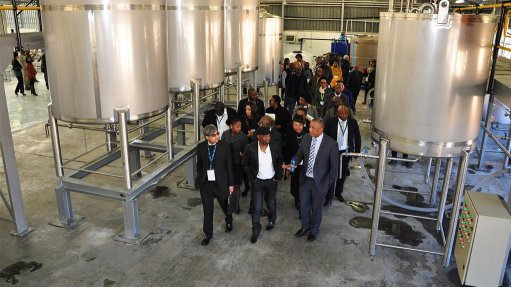
KEVALI FACTORY IN HARRISMITH Visitors and dignitaries tour the new chemicals factory in July
An industrial chemicals factory opened in the Maluti-a-Phofong special economic zone (SEZ), in Harrismith, Free State, will play a key role in supporting value chains that are logistically integrated through the transport node, says the Industrial Development Corporation (IDC) Chemicals and Textiles Industries divisional executive Shakeel Meer.
Kevali Chemicals executive director Funeka Khumalo says the new factory will produce chemicals for the food and beverage, petrochemicals, automotive, power generation, mining and pulp and paper industries. The company supplies water-treatment chemicals through strategic partnerships while the factory is being completed.
“Kevali Chemicals is playing a critical intermediate role in the chemicals value chain. Its products are a key input to the food and beverage industry and businesses like this helping to reduce costs to the consumer,” Meer says.
“The grant funding from the Black Industrialist Scheme partially funded the building of the Harrismith plant and has created 57 direct and 12 indirect jobs to manufacture a range of water-treatment chemicals, cleaning and disinfecting solutions, as well as adhesives. As part of the transaction, the IDC also enabled employees to acquire a stake in the business through a workers trust, says Meer.
Gauteng-based Kevali is a black-owned, Level 1 broad-based black economic empowerment chemicals manufacturing company founded by five professionals who recognised a significant opportunity in the market to support water treatment, says Khumalo.
“We will be focusing on our water treatment division over the next two years and will look at possibly expanding the plant to manufacture water treatment chemicals,” he says.
IDC Free State regional manager Nina Yose says the IDC’s strategies to enhance inclusivity are bearing fruit. “Our funding for black industrialists is increasing and this has improved black participation in the formal economy.”
Meer confirms: “As a country, it is crucial that we develop our own key industrial productive capabilities. We continue to invest in regional economies and ensure that black industrialists across all provinces are assisted to grow their businesses and local manufacturing.”
Khumalo notes that the current Maluti-a-Phofong factory is 3 000 m2 in size, but that a 10 000 m2 factory is being developed to replace the temporary facility. The factory will employ 30 people once it is in full production.
The company produces chemicals for use in a broad spectrum of industries, including agriculture. The cold chain logistics, which is a key service of Maluti-a-Phofong as an agricultural transport node, will require detergents and disinfectants, and most industries have a requirement for water treatment, such as for boilers and cooling towers, he says.
“Our goal is to expand our business to the rest of the continent with some of our multinational clients and our growth strategy is based on organic growth in current markets, geographical expansion and acquisitions when the opportunities arise. We already supply Namibia, Zimbabwe, Tanzania, Uganda and the Democratic Republic of Congo,” says Khumalo.
Further, the Free State Development Corporation is developing the Tshiame Food Processing Park as part of the SEZ. Up to 60 000 m2 of space is available for development, with opportunities in the production of potato crisps, potato flakes, maize grit, cereals and frozen vegetables production.
The hub will host multinational and domestic companies in the food production sector and will offer logistical services, warehousing, cold storage and manufacturing facilities to enhance production efficiencies. “This project is intended to position Harrismith as an agroindustry hub by creating value-adding capacity and ensuring that agricommodities produced in the Free State are processed locally and exported.